Berkshire County was established in 1761 — almost a hundred years after Hamshire (later Hamden, Hampshire and Franklin) County to the East. Why establish a new Massachusetts county at all? Why so much later than the rest of the state?
Objectives of Settlement Included Defense ad Revenue
By 1761, the last of the French and Indian wars were winding down, but the English administration had no way of knowing they were going to end up controlling the northeast of what would become the United States. So, settlement created an obstacle for potential continued raids by the French and their Indian allies. It also led to road building and increased trade On the flip side, the winding down of potential raids with the English capture of Quebec September 13, 1759, made settlement along the Hudson and the Housatonic more attractive.
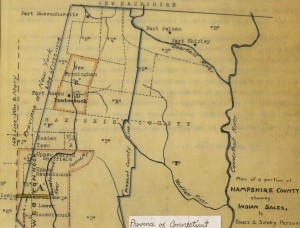
As we discussed in the history of Sheffield, New York landholders claimed southwestern Massachusetts based on purchases 1685-1704 from the Indians called the Westenhook patent. At one time, New York claimed their boundary ran to the Connecticut River. As indicated by the map below, there was still, as of 1761, controversy about the border remained.
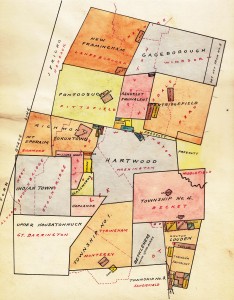
Settlement, the royal Massachusetts government reasoned, would help establish the border. In fact, the Massachusetts-New York border was not finally settled until a 1787 survey done by David Rittenhouse and Thomas Hutchins.
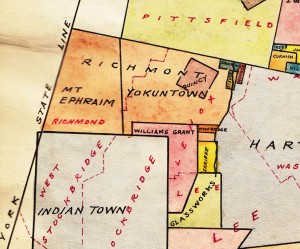
Detail of the early county map shows the land grants that had been given out prior to the establishment of Berkshire County. Many of them fell into what would become Lenox.
Finally, settlement meant revenue for the commonwealth from land sales and income from settlers. The Stamp Act was coming and the English were scrambling to pay for the French and Indian War.
The Wild West
Because of the fear of raids, the border disputes–and of course– the mountains Berkshire County remained largely unsettled. What would become Lenox had only a handful of families at the time. In Beer’s History of Berkshire County (page 66)* a 1744 Berkshire County population of 500 is estimated. We have not yet found a source for an estimate as of 1761 but 1,000 would be a reasonable guess based on the 1744 population. As shown below, settlement was still limited primarily to Sheffield and Stockbridge. Poontoosuc (later Pittsfield) had been settled then temporarily abandoned during the last French and Indian War.
The other demarcations show grants made to individuals. Many of them would be incorporated into what would later become Lenox.
Trails had only begun to be improved to be anything like roads. Anything that wasn’t swamp or rock was dense original growth forest with only a few meadows along the rivers.* The hearty initial settlers would have to have been good with an ax if they intended to farm.
The Governor Makes it Official
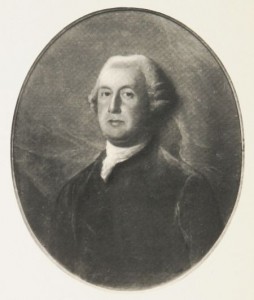
Francis Bernard (Sir Francis Bernard, the title granted after his return to England) was the royal governor of Massachusetts from 1760-1768.
He had an interesting history including being awarded Mount Dessert Island (Maine was then part of Massachusetts at the time) for his service. HIs service was an illustration of the close circle of patronage of Colonial posts in North America. His neighbor in England, Thomas Pownall had been an earlier governor of Massachusetts and his wife was a cousin of Lord Barrington who became Privy Councilor in 1755. Sir Francis had been governor of New Jersey 1758-1760.
The merit of his appointment can be questioned in retrospect. His strict and harsh enforcement of the Navigation Acts, the Sugar Act and other revenue acts contributed to the Revolution. He sought to have British troops stationed in Boston and was finally recalled in 1769 after publication of letters in which he criticized the Colonies.
One can imagine him being petitioned by the General Assembly and whatever the lobbyists of the time were to encourage settlement of the western part of the state. Landowners and speculators, among others, would have been interested in improving the value of their holdings.
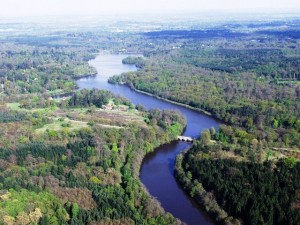
He named the new county for the county of his birth in England. In 1974 the town of his birth, Brightwell-cum- Sotwell became part of Oxfordshire. In southeastern England, Berkshire is one of the oldest counties in England (thought to date from the 840’s) and is the home of Windsor Castle.
*History of Berkshire County, Massachusetts, with Biographical Sketches of its Prominent Men, Vol. I, edited by Mr. J.E.A. Smith, J.B. Beers & Co. New York, 1885
